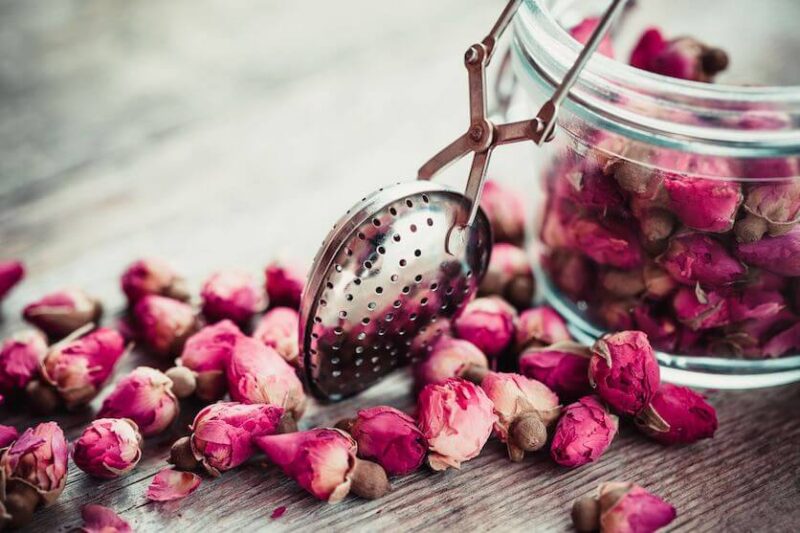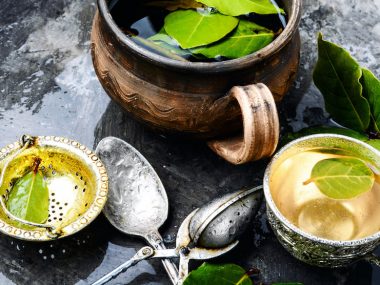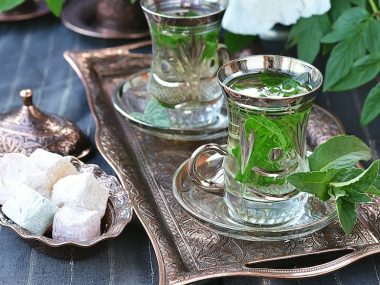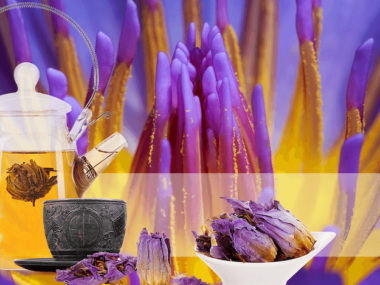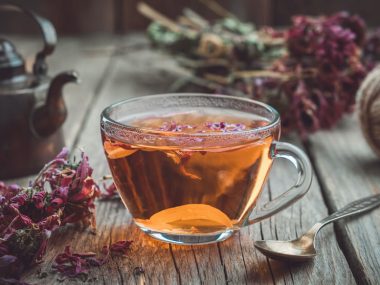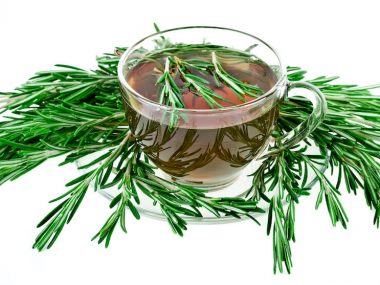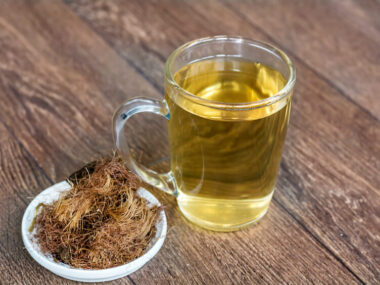How many of us find it hard to resist stopping to inhale a nearby rose and to admire its beauty? The mere essence of this beloved flower is captured in a cup of tea. How can such a marvelous creation of nature pack such a powerful punch when it comes to our health? Continue reading about rose tea to find out!
Table of Contents
What Is Rose Tea?
Rose tea is a tisane (herbal tea) made from either the petals of roses or the fruit (rosehips.) Other “rose teas” may be a black, green, or oolong tea with dried rose petals or rose hips added. There are hundreds of different rose plant species and cultivars used to make rose tea.
Different Types Of Rose Tea
When you hear the term “Rose Tea,” we typically think of a tea made from rose petals. However, there are numerous ways rose tea can be interpreted or prepared.
Other teas such as black, jasmine, or hibiscus may contain dried rose buds or petals. A rosehip tea contains dried rosehips (the red bulbous fruit left behind after the rose petals fall off.)
Red Rose Tea
Red Rose Tea is a name-brand tea marketed under the name “Red Rose Tea.” It is owned by the parent company Harris Tea. This tea is a blend of black teas sourced from India, Indonesia, Kenya, and Sri Lanka. The name is misleading because it does not contain roses.
Rose Milk Tea
Rose milk tea is known as a boba (bubble) tea which is made from milk, rose flavoring, and black tapioca pearls. Whipped cream may be added as a topper and finished with a wide straw to enjoy. Milk teas (bubble tea) are not a true tea and are often high in carbs because of sugar.
Rose Petal Tea
As a tisane (herbal tea,) rose petal tea is made from steeping either fresh or dried, rose petals. Many gardeners pick fresh rose petals from their garden to make this lovely tea. This tea is genuine “rose tea” because it contains nothing more than roses.
What Does Rose Tea Taste Like?
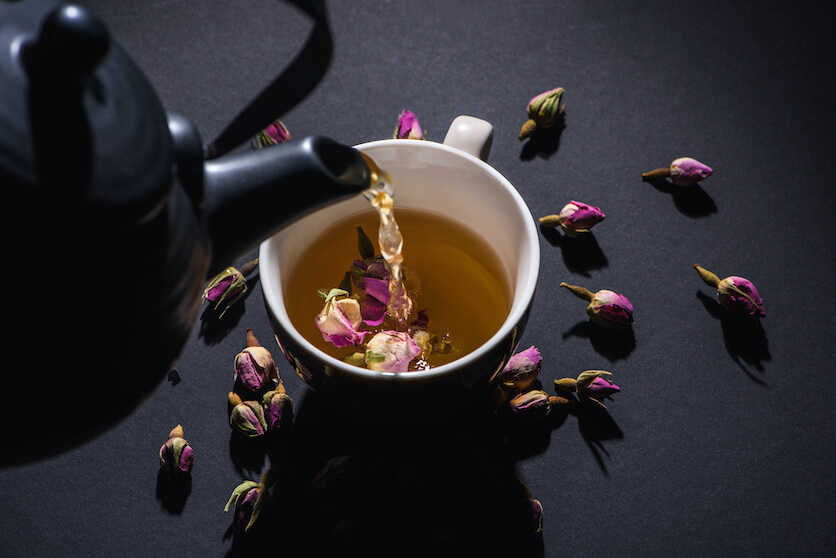
The genuine rose tea made from rose petals will have a subtle floral flavor with a mild sweetness. Although it’s not highly aromatic, the wonderful smell of roses comes through. Roses are perhaps one of the most beautiful flowers. The velvety petals emit one of the most coveted scents, in which essential oils are extracted to produce perfumes and various beauty products. The essence of a rose’s beauty and bouquet are captured in a teacup with rose tea.
Background Of Rose Tea
Roses have been admired for their beauty and lovely fragrance. Over the centuries, flowers, flower petals, and fruit are highly prized because of their medicinal benefits. Roses date as far back as 40 million years, according to fossils unearthed.
Today, this flowering beauty has evolved into thousands of different species and cultivars. However, there are a select few used to produce essential oils. The Cabbage Rose, China Rose, and Beach Rose plants are the predominantly used roses for essential oils because of their intense fragrance.
When it comes to using rose petals for tea, there’s no one rose plant used for the tea. Herbalists, tea makers, the food industry, and ourselves pick rose petals from whatever rose plants are accessible. Because of this, there are literally thousands of various rose teas enjoyed by tea drinkers.
How Much Caffeine Is In Rose Tea?
Because rose tea is a tisane (herbal tea), it does not contain caffeine. Herbal teas are caffeine-free. However, teas (such as black, green, or oolong) with rose petals added will contain caffeine. A caffeinated tea with rose petals or rose infusion may contain up to 50 mg of caffeine per six-ounce cup.
Does Rose Tea Make You Sleepy?
A study found that the essential oil produced from the petals of Rosa damascena had a relaxing effect on humans. When inhaling the rose oil, a state of relaxation was recorded on both a physiological and psychological level. Inhalation also resulted in a reduction of cortisol (a hormone that causes stress). So while rose tea won’t likely make you too sleepy, it can be somewhat relaxing.
Can I Drink Rose Tea Every Day?
There is no scientific data indicating any danger or harm from consuming a tea made with rose petals on a daily basis. A rose tea made from a blend of black, green, or oolong may have limitations on how much you should consume because of caffeine, infusions that may cause stomach upset, etc.
Rose Tea Benefits
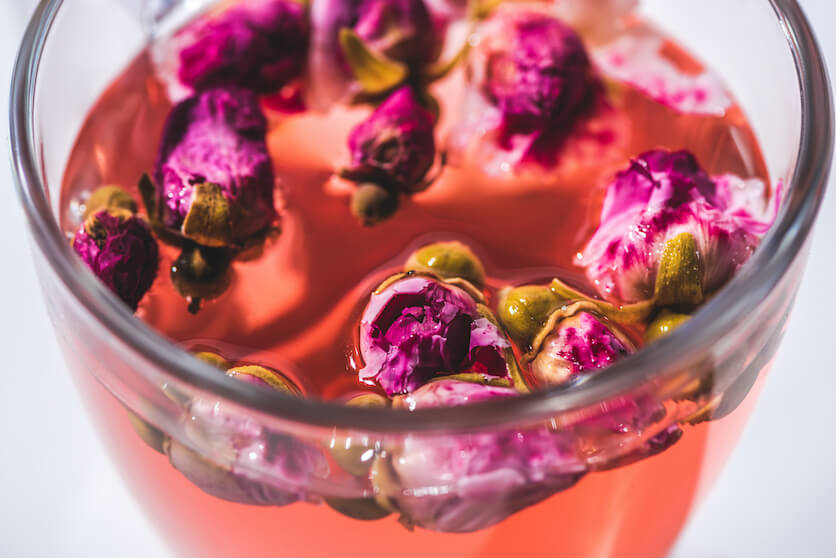
Rose petal tea is highly beneficial because of its terpenes, glycosides, flavonoids, and anthocyanins. Each of these components acts upon our bodies in a specific manner to improve our overall health. In fact, a study done indicates rose petal tea to have equivalent antioxidant properties equal to and even greater than green and black tea.
So, what is rose tea good for? Well, various constituents in rose petal tea target specific ailments and conditions.
- Limonene: anti-inflammatory
- Linalool: anti-convulsant
- Beta-Phenol: antimicrobial
- Citronellol: antispasmodic, anti-inflammatory, antibacterial, antifungal
- Nerol: anti-hypertensive
- Eugenol: antibacterial
- Farnesol: anti-inflammatory, anticancer
Antiviral
A study of how the rose acts as a healing agent looked at the extract of two rose species (Rosa nutkunu, Amelunchier ainifoliu.) It was found to fight against several viruses, which include Enteric Coronavirus and Respiratory Syncytial Virus (RSV.) Influenza A (H1N1) replication was inhibited by the extract.
Twelve other extracts of other rose species inhibited HIV-1. Yellow Fever and Murine Norovirus were prevented by replication due to the rose extracts. Additionally, compounds in the extract prevented Herpes Simplex-1, Parainfluenza Type-3, Coxsackievirus B1.
Antimicrobial
Another research study observed how individual substances in roses act as antimicrobials against different bacteria. Citronellol, geraniol, and nerol were found to be powerful at fighting Staphylococcus aureus.
Respiratory
In hopes of uncovering new antibacterial properties of the rose, a study was done using the extract from the rose for respiratory tract conditions. Inhaling the extract caused the right prefrontal brain cortex to light up, resulting in a sense of relaxation. Researchers stated that asthmatic patients benefit from inhaling rose oil. There is a direct correlation between asthma (inflammation, oxidative stress) and the benefits of limonene, citronellol, and farnesol present in roses.
Why Is Rose Tea Bad For You?
Rose petal tea is not bad for you, providing you get your rose petals from a reliable source or a rose plant free from pesticides. Food-grade dried rose petals or rosebuds should be used for making tea. Dried roses for crafts or roses from a florist most likely contain harmful chemicals.
Tea companies are a perfect place to purchase roses for tea because they have taken the time to vet the source/origin. Quality assurance is much more reliable with tea retailers. Herbalists also sell roses online, but you have no way of knowing whether or not those roses were cultivated in such a way that qualifies them as food-grade.
The best way to enjoy a good clean rose tea is to pick your own roses out of your garden (provided they have not had a pesticide application.) It’s always good practice to thoroughly wash the petals before using them.
Herbal teas have the potential to interact with conventional prescription drugs. More importantly, the herbs (i.e., rose petals, buds, fruits) may be contaminated with heavy metals such as lead, arsenic, or mercury. Bacterial contamination is another factor to heavily weigh when sourcing herbal teas.
So, yes, rose tea can be harmful if you acquire roses that are not food-grade or come from a less than ideal source/origin.
How To Make Rose Tea
We have provided a few ways to enjoy tea made from roses. Not all roses offer the same flavor in a tea. Some may be more bitter, while others are floral and sweet. The most fragrant-smelling roses are traditionally better for tea. The less scent they have, the more bitter they will be.
Simple Brewed Rose Tea
This recipe is rose tea in its unadulterated form.
Tip: Pair this simple, floral tea with strawberry shortcake or a warm scone with clotted cream and a dollop of strawberry jam.
Ingredients
- 1 teaspoon of dried roses (or a few fresh petals)
- 2 cups of water
Directions
- Bring the water to a boil.
- Remove from the heat.
- Add the roses, cover, and let steep for 10 minutes.
- Strain the roses and discard them.
- Pour the tea into a teacup and enjoy!
Strawberry-Rose Iced Tea
This delicate, refreshing tea is perfect for enjoying on a Sunday afternoon on the front porch or for entertaining.
Ingredients
- 6 cups of water
- 6 teaspoons of dried roses (or 1 cup of loose fresh rose petals)
- ½ cup of fresh strawberries pureed
- Ice
Directions
- Boil the water.
- Remove from the heat.
- Add roses, cover, and allow to cool until it to steep for 10 minutes.
- Remove the cover and allow the tea to reach room temperature.
- Strain and discard the roses.
- Pour the tea into a pitcher.
- Add the strawberry puree and mix well.
- Pour into glasses filled with ice, and enjoy!
Tip: Fill ice trays with water and drop a small rosebud into each cube section. Freeze until hard. Drop into the glasses to add a beautiful decorative effect.
There’s No Denying Rose Tea Is A Beauty!
Rose tea has so many positive things going for it that it makes it hard to resist enjoying it. Whether you choose to drink it hot, cold, or as an herbal additive to another tea, roses provide us with the boost in health we could all use.
